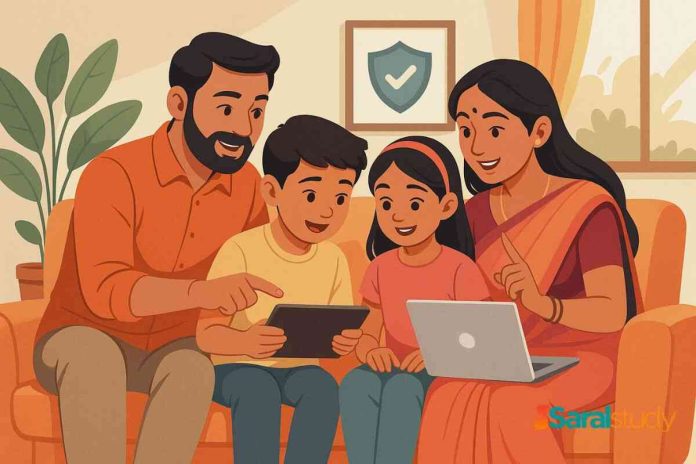Children are spending more time online than ever before in today’s digital world. The internet provides enjoyment and knowledge through social media and online education, but it also has unspoken risks. Parents frequently worry about harmful information, internet predators and cyberbullying. The good news is that most problems can be avoided by teaching children basic online safety rules or guidelines.
Parents guide to Online safety rules
The ten most crucial online safety rules or guidelines that every parent should instill in their children will be discussed in this article. These are simple, useful and made to protect children while allowing them to profit from technology.
1. Never Share Personal Information Online
Kids should understand that personal details are private. This includes:
- Full name
- Address
- Phone number
- School name
- Passwords
Even something small, like sharing a school photo with a uniform, can reveal sensitive information. Teach your child to never share this without your permission.
2. Use Strong and Unique Passwords
Children often use simple passwords like “12345” or their own name. Explain the importance of strong passwords with a mix of letters, numbers and symbols.
Tip: Encourage them to create a password phrase, like “MyCatRunsFast2025!” which is easier to remember but hard to crack.
3. Don’t Talk to Strangers Online
Just like in real life, talking to strangers online is risky. Explain that not everyone is who they claim to be. Online predators often pretend to be children to gain trust. Teach your child to ignore unknown friend requests, messages or chats.
4. Think Before You Click
Many online scams start with a simple link. Kids should know:
- Never click on suspicious links.
- Avoid downloading files from unknown sources.
- Always ask parents before installing new apps or games.
- This simple rule prevents malware, phishing and scams.
5. Report and Block Cyberbullies
Cyberbullying is one of the biggest online dangers for kids. Teach them:
- Never reply to mean or hurtful messages.
- Use “block” and “report” features on apps.
- Always tell a parent or teacher immediately.
- This helps children build confidence to stand up against bullying safely.
6. Limit Screen Time
Too much screen time can affect health and studies. Parents should set healthy digital limits. A good rule is:
- No screens during meals.
- Screen – free bedtime.
- Breaks every 30 – 40 minutes of online activity.
This creates balance between online learning, play and real-life interactions.
7. Only Use Age-Appropriate Apps and Websites
Many apps have age restrictions for safety reasons. For example, most social media platforms require users to be 13+. Teach your child to use apps that are safe and age-appropriate.
Parents can also enable parental controls on devices to filter harmful content.
8. Always Log Out from Shared Devices
If kids use a shared computer at school, a cyber cafe or even a friend’s phone, they should always log out after use. Staying logged in can lead to misuse of their accounts.
9. Respect Privacy – Theirs and Others’
Digital citizenship is important. Children should learn to respect their own privacy and also that of others. This means:
- Not posting embarrassing photos of friends
- Not sharing others’ secrets online
- Asking before tagging or sharing someone’s picture
10. Always Talk to Parents About Online Problems
The most important of online safety rules: open communication. Kids should feel safe to tell parents if:
- Someone asked them for personal info
- They saw something inappropriate
- They felt bullied online
A child who communicates openly is far less likely to fall into online traps.
Conclusion
The internet is an amazing tool, but safety must come first. By teaching these 10 online safety rules, parents can ensure that children enjoy the digital world responsibly and securely. Remember – staying safe online is not about fear, but about smart habits and awareness.
Also Read: Top 8 internet Safety terms Parents Must Know to Keep Children Safe





